What does it mean to try to lose body fat percentage quickly, and why do people often seek fast results?
Put simply, Safer rates of fat loss are less exciting. People often want instant, visible results that are gratifying and motivating. Who wouldn’t want to get the results now, then figure out how to keep them? The long-term work to form lasting habit change and lasting success seems almost too subtle to justify the effort.
While there are no official guidelines, about 0.5% loss per week or 1-2% per month is considered safe and intended to prevent excess loss of muscle. That’s roughly 1-2 lbs of weight loss per week, depending on starting weight. You may see more loss at first, but it slows over time as the body adapts.
Quick fat loss means a big drop in the amount of calories you eat. The person following a more conservative path may be trying to cut out 500 to 1,000 calories per day. That could be a few meals’ worth of calories for some people. Pushing calories even lower than this means you pay extra attention to every bite; things add up more quickly now. You may measure out portions for every meal, or track every last thing you eat and drink on an app. You don’t go out to eat as often, and you cut way back on ‘fun’ foods like an occasional cookie or scoop of ice cream. You stress about an extra tablespoon of salad dressing. You develop a love-hate relationship with macros. There is much less room for error. It is more challenging to sustain over the long run.
Things move quickly in society, from communications to online shopping to travel. That same expectation tends to be extended to our bodies. With that in mind, let’s take a look at how to lose body fat percentage in a week.
Realistic Outcomes of Losing Body Fat Percentage in a Week

Pushing for higher, faster rates of fat loss can mean you restrict calories to the point you can start losing muscle at a higher rate, too. When we lose weight under normal circumstances, we lose as much as 25% of that weight from muscle. (If you lost 80 lbs, for example, 20 lbs of that may be from muscle loss.).
Most people would agree that losing muscle isn’t great. So, why is it so important to consider weight loss? When the incoming fuel (calories) supply drops too low, the body has a backup mechanism to break down muscle and convert it to fuel. (That can extend to your organs if it goes on long enough.) Muscle is the primary tissue in the body that burns calories—the less you have, the less you burn. This means you risk easier weight regain in the future, along with seeing effects on strength and stability. If you lose a lot of muscle mass, then you also run the risk of ‘metabolically unhealthy normal weight’ (MUNW), which means you look ‘healthy’ on the outside, but your body mass contains less muscle. You have a higher ratio of fat mass to lean mass than we would expect for that weight. The risk for heart disease and diabetes goes up when this occurs.
Another undesirable outcome: you risk getting gallstones. These are known to occur with rapid weight loss, like that in people who have had bariatric surgery.
Pushing too quickly for weight/fat loss means the results are often not permanent, given the major lifestyle changes required to see and keep results. Once you’re “off” the diet, you’re back to square one. This comes up time and again in my work with clients.
Calculating Body Fat Percentage

“There are several different ways that we can calculate body fat percentage,” says Courtney Pelitera, MS, RD, CNSC, Registered Dietitian at Top Nutrition Coaching, specializing in sports nutrition & wellness nutrition. “‘The Gold Standard,’ or the best known way to measure body fat percentage, is through a DEXA scan. This equipment is found in medical laboratories and measures fat tissues, lean muscle mass, and bone density all in depth. Other high-quality options found in laboratories include the ‘Bod Pod’, which measures displacement of air and underwater hydrostatic weighing. Since these options can be a costly endeavor with equipment not readily available, bioelectrical impedance analysis (BIA) estimates body fat percentage with measurement of how electric currents flow through the body. This is a popular method in gyms and might be known as the 'In-Body Scanner.' Another feasible way to calculate body fat percentage is with body caliper measurements. In this method, we measure certain skinfold areas of the body and enter measurements into an equation to calculate body fat percentage. Accuracy of this method is going to be higher in those who have a high level of experience with using the tool to take body fat measurements.”
“Measuring body fat percentage can be more helpful in assessing health than weight alone,” adds Pelitera. “This is because muscle weighs more than fat, therefore affecting overall weight, even if an individual is very healthy. These methods help to assess our subcutaneous fat tissue, which sits under the skin. It is a helpful measurement in those looking to reduce fat to improve health markers.”
Significant Changes in Body Fat Percentage Can be Achieved in a Week
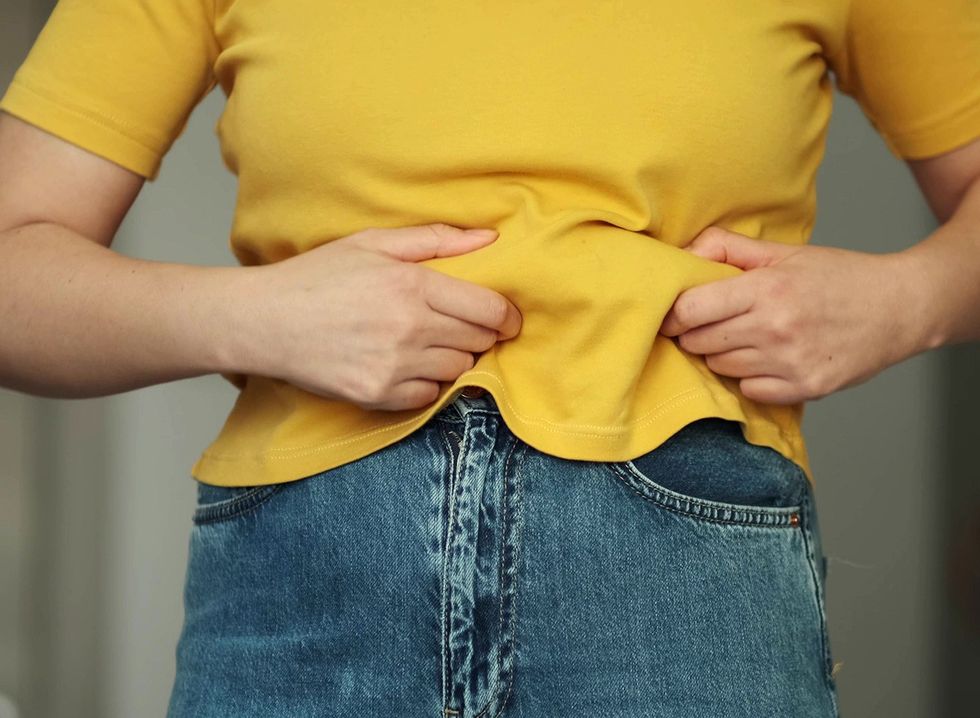
“In very extreme circumstances such as intense caloric restriction or a state of illness, a small body fat change could be seen over a one-week time period,” says Pelitera. “For the average person, the time to see a change in body fat percentage is going to range from a few weeks to a few months. If very quick results are seen using a technique such as BIA or skinfold calipers, different reasons should be looked at, such as hydration status, sodium consumption, or user error, which can all affect results.”
Safe Strategies for Quick Fat Loss
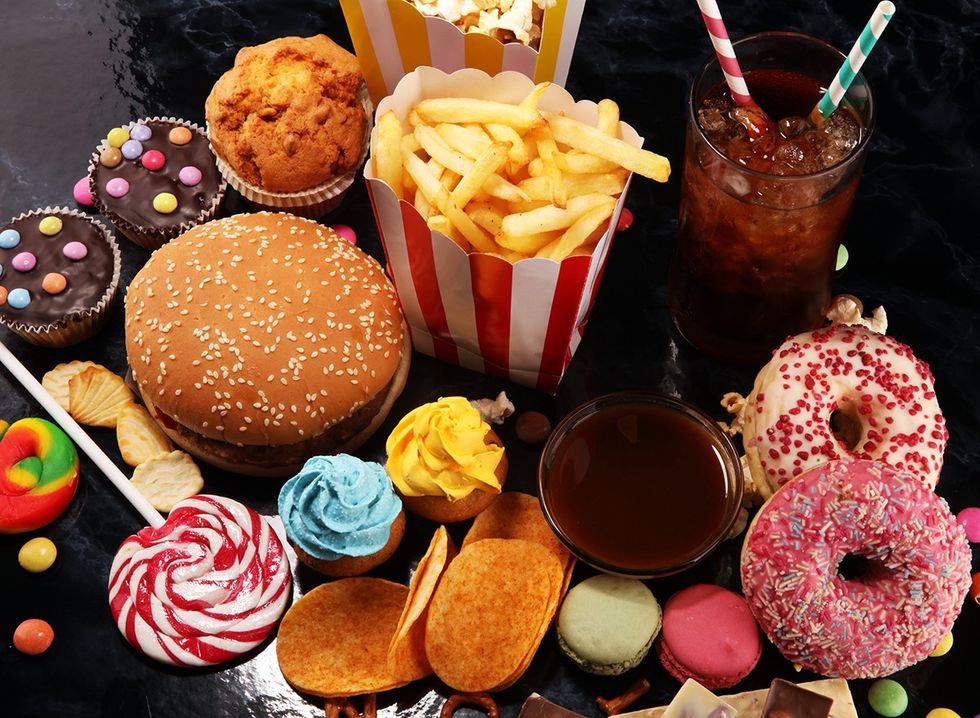
There are some safe practices for attempting to reduce body fat percentage quickly? And how do diet adjustments contribute to rapid fat loss, and what guidelines should be followed to ensure safety? “One of the easiest ways to start losing fat quickly and healthily is to reduce your intake of sugar-sweetened foods and refined carbohydrates that are quickly metabolized. Excess carbohydrates get stored as fat if they aren't utilized quickly,” says Megan Hilbert, MS, RDN, a Registered Dietitian specializing in gut health nutrition, IBS, Intuitive Eating/Gentle Nutrition, and the gut-brain axis. For example:
- “Eating more plant-based foods (nuts/seeds, whole grains, fruits, vegetables, etc.) can also help promote weight loss due to the fiber and phytonutrient content that helps increase satiety and influence our metabolism through the gut microbiome
- Balancing a plant-based meal with a quality source of lean protein also helps contribute to satiety. Protein influences our satiety cues by dampening our hunger cues and reducing appetite. Getting around 25-30g of protein per meal (equivalent to 4 oz of chicken breast) is ideal.
- Lastly, making sure you're properly hydrated is one of the most important ways to lose weight and enhance fat metabolism. Water plays an essential role in lipolysis, which is how the body burns fat for energy.”
Role of Hydration and Sleep
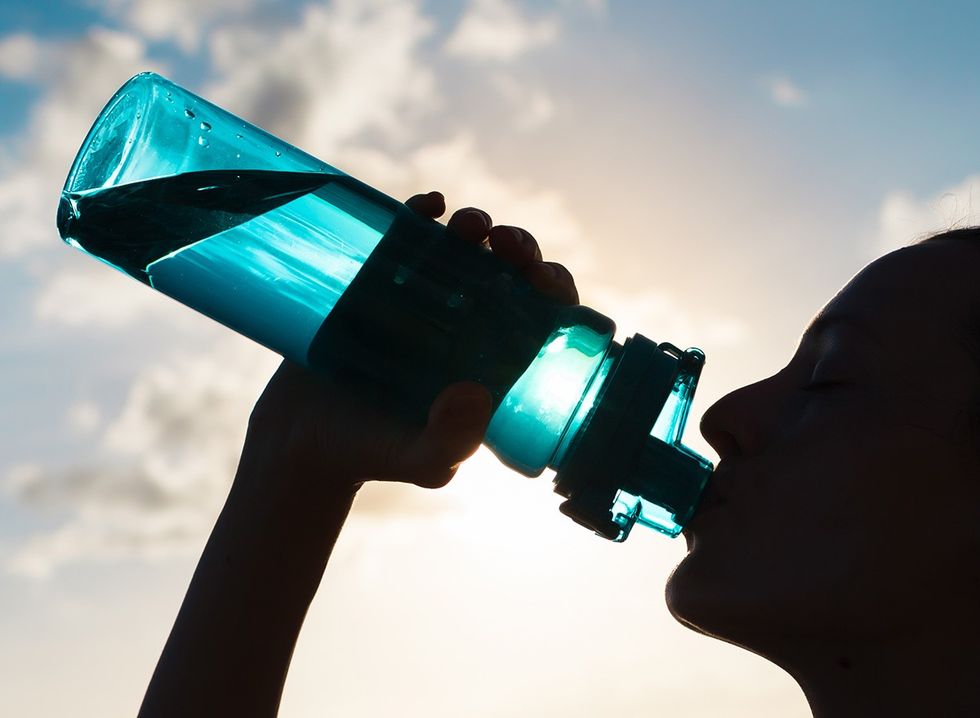
How do hydration and sleep affect body fat loss, especially when trying to achieve quick results? “Hydration status can sometimes mask fat loss if an individual is well hydrated. This is because there is both intracellular and extracellular fluid to account for, especially when using the most common form for body fat percentage measurements in BIA(1). The intracellular fluid in muscle cells is what causes muscle mass to weigh more than fat mass,” says Pelitera. “It should be noted that in extreme fat loss situations such as bodybuilding competitions, individuals often intentionally dehydrate to lose as much subcutaneous water as possible before competition. This provides the most muscle definition (2).”
“Poor sleep habits have been linked with an increase in overall energy intake (3) and a decrease in metabolism. These two aspects alone are going to make achieving fat loss at any rate more difficult,” says Pelitera.
Can improving sleep quality and water intake have an immediate effect on body composition? “Working on improved sleep habits, sleep quality, and hydration are some of the first things I work on with clients trying to lose body fat as a registered dietitian. Improvements in both sleep quality and hydration provide overall improvements in metabolism and the body’s ability to produce energy. While neither of these is going to have an immediate effect on body fat, sleep in particular, which changes on a day-to-day basis, is associated with calorie intake the next day. This is going to be the most immediate effect we see. A night of poor sleep is going to result in increased energy intake the next day, affecting your fat loss results,” says Pelitera.
Exercise for Accelerating Fat Loss

What types of exercises are most effective for quick fat loss, and how should they be integrated into a weekly routine? Are there any specific workout programs or routines recommended for those looking to make noticeable changes in a short timeframe? “For the fastest, healthy fat loss, it's important to incorporate at least 150 minutes of moderate aerobic activity in, or 75 minutes of vigorous aerobic activity in a week. This, plus strength training around 3 times a week, is a good balance, as added muscle mass helps to burn fat and increase metabolic output even while in a rested state,” says Hilbert. “The most important exercise you can do is one you will stick to in the long run. Most people struggle with losing weight because they have a hard time adhering to changes in their routine. First, building a consistent habit of exercise rather than focusing on the specific types of exercise is most important. To find workouts that are a ‘best of both worlds’ when it comes to cardio and building muscle, I often suggest kickboxing, pilates, spinning, rowing, or swimming.”
Nutrition and Supplementation

What nutritional strategies and supplements can support rapid fat loss while maintaining health? Are there any foods or supplements that should be avoided during this period? “I typically do not recommend any specific weight loss supplements because often these can over-promise and under-deliver. Not to mention, the supplement industry is unregulated and weight loss supplements have been known to contain laxatives, diuretics, and additives that can cause liver damage,” says Hilbert. “That being said, certain vitamins and minerals are important for fat loss, so taking nutrition supplements if one is deficient can help promote faster weight loss.” She continues:
- “Up to 30-40% of the world population is iron deficient, and iron helps support numerous metabolic processes like building lean muscle mass and carrying oxygen to cells.
- Magnesium also plays a really critical role, and many Americans (50-80%) are deficient. Magnesium deficiency can weaken the body's ability to use blood sugar for energy. Certain studies also show magnesium supplementation can help reduce BMI for those with insulin resistance, obesity, and hypertension. (The effects of magnesium supplementation on obesity measures in adults: a systematic review and dose-response meta-analysis of randomized controlled trials)
- B vitamins also play an important role in metabolism, in particular, helping the body break down carbohydrates and protein to convert them into energy. Some research has shown that deficiency in vitamin b12 and b6 is linked to excess weight, however more research is needed in this area.”
Managing Expectations
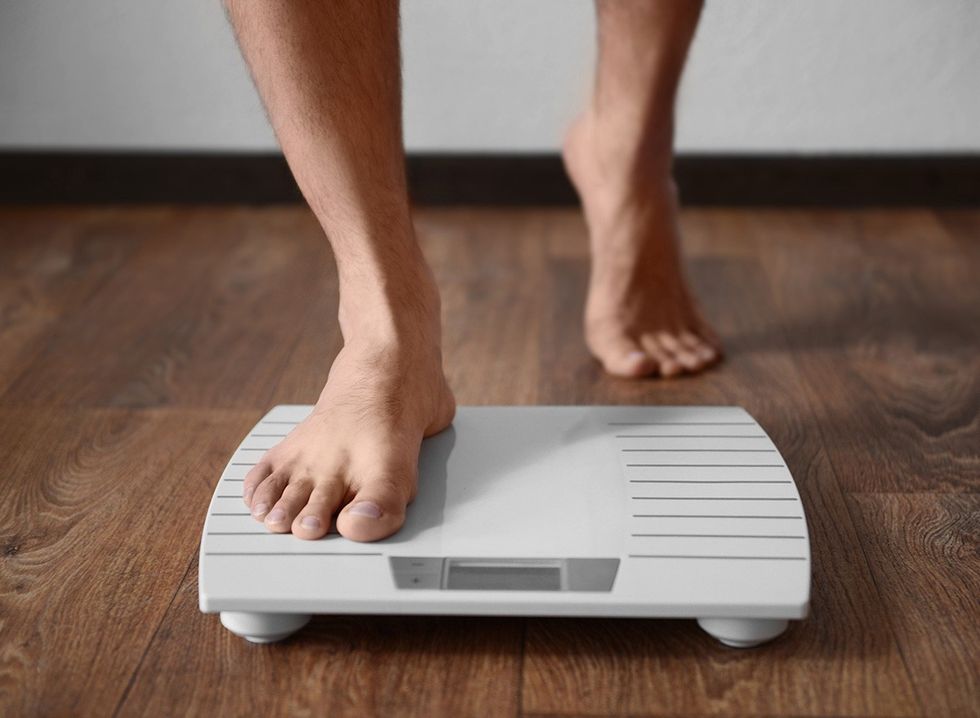
“Realistic expectations for body fat loss really vary person to person,” says Jordan Hill, MCD, RD, CSSD, Lead Registered Dietitian. “Some factors to consider include starting body composition, current nutrition and exercise habits, genetics, current health implications or status, medication use, as well as overall lifestyle factors. In general, a 0.5-2 lbs loss/week is considered safe and sustainable. Some folks may lose a little more or less on any given week though. It’s important to remember that weight loss is not linear and often times a person’s weight will fluctuate up and down throughout their weight loss journey. To set achievable goals, it’s important to focus on the process instead of the outcome and implement realistic and sustainable habits. Being patient and applying flexibility to the plan when needed can help set realistic expectations and give oneself grace when the inevitable setbacks occur.”
How can focusing on quick results impact long-term health and fitness objectives? “When folks try to achieve quick results, they are oftentimes setting themselves up for failure because quick results aren’t usually realistic or sustainable,” says Hill. “Rapid weight loss generally results in an undesired loss of muscle mass vs. targeting the desired fat loss. Aiming for quick results usually entails either under-eating, overexercising or a combination of the two. This can increase the risk for burnout, nutritional deficiencies, and an unhealthy mindset or relationship with food and body.”
Realistic Changes in Body Fat Percentage

As she noted previously, “0.5-2 lb loss/wk is a realistic expectation for those implementing healthy habits to see weight loss. A person can really only lose 1-1.5% of body fat per week, so if someone is losing about that percentage, it may very likely be just water weight or potentially muscle mass. Typically, a person with a higher fat percentage has the potential to lose at the higher end of the 0.5-2 lb range vs. someone who has less fat mass to lose,” says Hill.
Potential Risks

“There are many potential risks of trying to lose body fat too quickly, and most are associated with extreme measures of calorie restriction such as fasting and/or very low-calorie diets,” says Colette Micko, MS, RDN, CDES. “Losing fat mass at a rapid rate increases the chances of breaking down muscle for energy, which is counterproductive to leaning out and reduces resting metabolic rate in the long run. Additionally, this can lead to poor workout performance and recovery, disrupted sleep, increased hunger and irritability, and inability to focus and perform activities of daily living. There are also psychological risks associated with losing body fat too quickly, such as worsening one's body image and overall relationship with food.”
How can individuals mitigate these risks while pursuing their fat loss goals? “In order to mitigate these risks, it’s important to allow ample time to reach one’s goals,” says Micko. “Moderate calorie restriction, about ~300-500 calories from baseline intake, in addition to keeping protein intake high, are important factors to consider when aiming to lose body fat. In general, aim to get about 30-40 grams of quality protein every 3-4 hours (this will vary depending on total protein and energy needs). The benefits of keeping protein intake high and spreading it out throughout the day is to spare muscle protein breakdown and increase the feeling of fullness between meals.”
“Nutrient timing and fueling around your workouts also becomes even more important when in a calorie deficit,” says Micko. “Many clients will try to lose body fat by fasting before their workouts. However, this often leads to low energy and reduced ability to complete the workout with desired strength. Thus, fueling around your workouts is key to keeping energy levels high so you can perform your best throughout the workout. This not only allows you to burn more calories during the workout itself, but also helps to maintain your strength and stamina. Aim to get at least 20-30 grams of quick-digesting carbs (a small piece of fruit such as a banana works great here) prior to your workout, and refuel within 1-2 hours of completing your workout with a well-balanced meal or snack that combines protein and carbohydrates.”
Psychological Impact of Rapid Fat Loss Efforts

How can the pursuit of quick fat loss affect an individual’s mental health and body image? “I have worked with many people over my years of practice, and while each has their own unique story and needs, there are some common threads,” says Snyder. “When one cuts way back on what they eat to lose body fat at a fast pace, it can result in irritability. It affects social relationships. I mean, if you can’t go to the neighborhood barbecue because you are worried about taking in too many calories, it isn’t fun. It leads to feeling more isolated. Your concentration can take a hit if you’re constantly hungry or aren’t eating enough carbohydrates for brain fuel. That could add more stress if you’re struggling with getting your work done. You can become resentful, making so many sacrifices and not getting the quick and drastic results you envision. There’s a feeling of failure when things don’t work out. There is a huge blow to self-confidence and body image. There’s a risk of repeated dieting behavior turning into an eating disorder or disordered eating. You start comparing yourself with others, and it’s never good enough. It’s a sad cycle.”
What strategies can help maintain a healthy perspective on body composition and weight loss?
“It’s important to talk about realistic expectations and why the desire for the loss is there in the first place. Sharing the risks and actual costs that come with a more aggressive goal is vital—I want to ensure my clients know what to expect if they elect that route. We also discuss how one can achieve more realistic goals without sacrificing so many things in the process,” says Snyder.
“For setting up a successful mindset, we look for ways someone can take action and feel a sense of achievement in the journey. Doing so and accomplishing these smaller goals adds little bursts of motivation. Drinking an extra glass of water each day, adding more fiber to a meal, or trying plant proteins are all examples of this. We celebrate all of the wins, big or small, versus waiting to be happy at the end. We work through barriers, or things that can get in the way of progress. We revisit expectations.
I’m all about education and staying curious. In this case, it can be helpful to talk about the role of body fat and provide evidence-based information to help understand that not all fat is a bad thing. We do need some body fat to function normally, and it exists in practically every cell in the body (including the brain). It does so many things: helps us absorb and use certain vitamins, plays a role in keeping hormones in check, manages body temperature, immune function, and reproduction. We also can’t exactly dictate where fat loss will occur on the body, and we all carry fat differently.”
The Importance of Professional Guidance

You should consider seeking professional advice before attempting rapid fat loss. “When attempting rapid fat loss, it is always suggested to work with a qualified professional to ensure you are minimizing any potential risks and doing so in a safe and effective way that considers long-term implications. It is never too late to reach out for support, so if you have already started a rapid fat loss regimen, but need some guidance, I recommend reaching out to a qualified medical professional such as a registered dietitian, personal trainer, or physician who specializes in metabolic health. These professionals can also help provide guidance on tools to effectively measure body composition, so you can track real progress. Many home body composition testing machines have low reliability, so utilizing evidence-based tools such as DEXA or BodPod is recommended,” says Micko.
She adds: “Dietitians, Personal Trainers, and Medical Professionals can help with developing an individualized nutrition and exercise plan to help you meet your fat loss goals. These professionals not only want to help you lose body fat, but keep it off long term. Medical professionals who specialize in this area not only take into account your personal goals, but important factors such as food preferences, cooking skills and resources, healthy history, exercise, nutrition, sleep, stress and social factors that may influence your health behaviors.”
Related: 15 Proven Ways to Sculpt Your Dream Body by An Expert Coach
Long-Term Strategies Beyond the Week

After attempting to lose body fat percentage in a week, what long-term strategies should be adopted for sustainable health and fitness? “Focusing on regularity of eating times, appropriate nutrient balance and portion sizes, proper hydration, a regular exercise routine, and adequate sleep are all ways to build a sustainable health and fitness plan for managing weight. Setting realistic goals, being patient with progress, and evaluating progress can all help with the sustainability as well. Working with a registered dietitian and building a supportive network of family and friends are a couple of ways to boost confidence and accountability, especially when there are challenging seasons,” says Hill.
“Shifting your mindset and perspective on weight management is a must. Moving away from the “quick loss” mindset to one that is more long-term will be more realistic and sustainable to see both progress and maintenance of that progress. All good things come with time, consistency, and hard work!” says Hill.
Conclusion: Emphasizing Health Over Speed

It is important to prioritize health and sustainability over the speed of fat loss. “For high-speed fat loss, you are likely going to go to more drastic measures. We’ve talked about how that can affect your mental health and body image, but it also spells trouble for the future. Rapid loss plans do work—until they don’t. The faster you try to lose weight, the more you alarm the body and run the risk of tanking your metabolism for next time. You gain the weight back, try to lose it again, gain it back, rinse, and repeat. Calorie burning (metabolism) slows down to match calorie restriction, as the body goes into survival mode. (You eat way less, and your body burns less fuel.) The weight gain-loss pattern is referred to as ‘weight cycling,’ and is correlated with gaining more body fat.
Slower, long-term work includes a focus on building in lifestyle changes and addressing any challenging thoughts about food and body. You learn to work with your body instead of against it. It’s easier to adapt to and maintain vs something very intense for a short time. Positive outcomes and helpful habits last longer--your efforts pay off even beyond any weight/composition change goals.
Related: 8 Ways to Eat Your Way to 6-Pack
Final Advice For Individuals Seeking to Reduce Their Body Fat Percentage Responsibly

Scientists recommend more gradual, sustainable weight loss based on multiple studies. “Be patient, as lasting change is more subtle, and it’s easy to get discouraged. Find smaller goals to achieve along the way—they act as ‘rest stops’ on a long journey. This breaks up the time and can renew motivation. The small things are huge when done repeatedly—even if you’re not losing weight or inches at times, you are very likely still improving some less-obvious facet of your health. Get support, someone who can reflect back to you in an honest and kind way when you’re feeling stuck or frustrated. Get a vision in your head of what your life looks like when you hit your big goal—what will you do to maintain your success? What barriers might you hit, and what tools do you have to work through them? Finally, regardless of what your body shape and size is at any point in your journey, you are a worthy human who deserves kindness. Whatever your goals are, may they serve you on the inside, too. And if you enjoyed this article, take advantage of these 20 Superfoods for People Over 50.
About the author:
Annette Snyder, MS, RD, CSOWM, LD, is a Registered Dietitian at Top Nutrition Coaching
References
- Campa, F., Toselli, S., Mazzilli, M., Gobbo, L. A., & Coratella, G. (2021). Assessment of body composition in athletes: A narrative review of available methods with special reference to quantitative and qualitative bioimpedance analysis. Nutrients, 13(5), 1620.
- Escalante, G., Stevenson, S. W., Barakat, C., Aragon, A. A., & Schoenfeld, B. J. (2021). Peak week recommendations for bodybuilders: An evidence based approach. BMC Sports Science, Medicine and Rehabilitation, 13(1), 1-24.
- Jurado-Fasoli, L., Mochon-Benguigui, S., Castillo, M. J., & Amaro-Gahete, F. J. (2020). Association between sleep quality and time with energy metabolism in sedentary adults. Scientific reports, 10(1), 4598.















 Copyright Brittany Werner
Copyright Brittany Werner Shutterstock
Shutterstock Copyright Brittany Werner
Copyright Brittany Werner Shutterstock
Shutterstock Shutterstock
Shutterstock Shutterstock
Shutterstock Copyright Brittany Werner
Copyright Brittany Werner Shutterstock
Shutterstock Copyright Brittany Werner
Copyright Brittany Werner


 Shutterstock
Shutterstock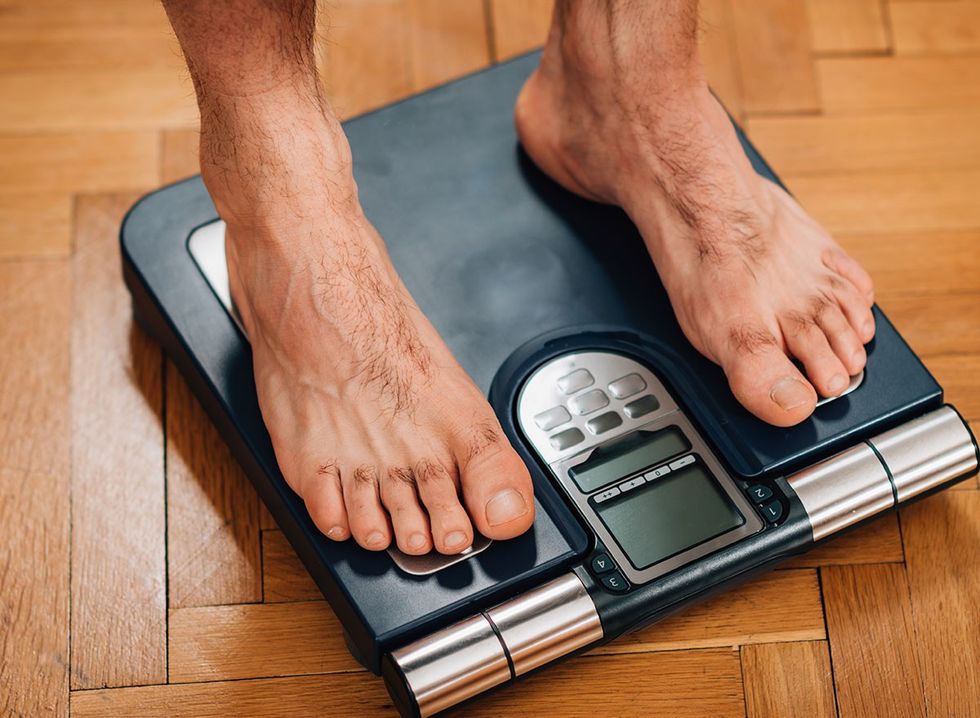 Shutterstock
Shutterstock Shutterstock
Shutterstock Shutterstock
Shutterstock Shutterstock
Shutterstock Shutterstock
Shutterstock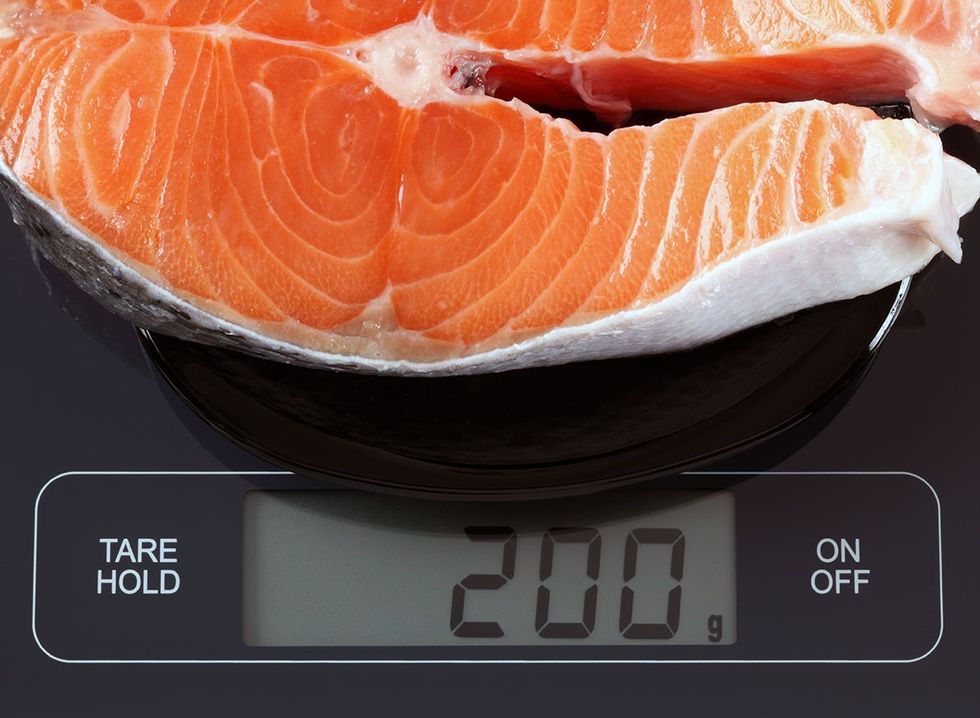 Shutterstock
Shutterstock Shutterstock
Shutterstock Shutterstock
Shutterstock Shutterstock
Shutterstock Shutterstock
Shutterstock Shutterstock
Shutterstock Shutterstock
Shutterstock Shutterstock
Shutterstock Shutterstock
Shutterstock Shutterstock
Shutterstock Shutterstock
Shutterstock
 Shutterstock
Shutterstock Shutterstock
Shutterstock Shutterstock
Shutterstock Shutterstock
Shutterstock Shutterstock
Shutterstock

 I'm a Nutritionist and These 9 High-Protein Snacks Keep My Clients Full While Losing 50 Pounds
I'm a Nutritionist and These 9 High-Protein Snacks Keep My Clients Full While Losing 50 Pounds
 Shutterstock
Shutterstock 2. Processed FoodsShutterstock
2. Processed FoodsShutterstock Shutterstock
Shutterstock Shutterstock/Prostock-studio
Shutterstock/Prostock-studio Shutterstock
Shutterstock Pro TipsShutterstock
Pro TipsShutterstock Shutterstock
Shutterstock Shutterstock
Shutterstock Shutterstock
Shutterstock Don’t Drink as Much AlcoholShutterstock
Don’t Drink as Much AlcoholShutterstock Most Women on GLP-1s Are Making a Few Common MistakesShutterstock
Most Women on GLP-1s Are Making a Few Common MistakesShutterstock Soda and Sugary DrinksShutterstock
Soda and Sugary DrinksShutterstock Shutterstock
Shutterstock Eat BreakfastShutterstock
Eat BreakfastShutterstock And Improve Insulin SensitivityShutterstock
And Improve Insulin SensitivityShutterstock Belly Flab Strip Tip: Sugar and Fat Calories Leave Its Mark on Your BodyShutterstock
Belly Flab Strip Tip: Sugar and Fat Calories Leave Its Mark on Your BodyShutterstock Shutterstock
Shutterstock The Drugs Mimic the GLP-1 Hormone Naturally Produced by the BodyShutterstock
The Drugs Mimic the GLP-1 Hormone Naturally Produced by the BodyShutterstock 3. Deep-Fried ItemsShutterstock
3. Deep-Fried ItemsShutterstock